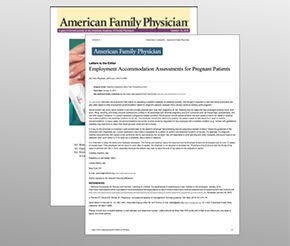A family doctor’s role in protecting the rights of pregnant workers
 In recent months there has been much discussion in the media about employment accommodations for pregnant women, especially surrounding the Supreme Court Case Young v. UPS. Family physicians can play an important role helping pregnant women get the appropriate workplace accommodations. Recently RHAP’s Reproductive Health and Advocacy Fellow Carrie Pierce, Medical Director Linda Prine, and Research Associate Gabrielle DeFiebre published a letter to the editor in the American Journal of Family Medicine highlighting the role of family physicians in facilitating pregnancy accommodations. Read the key points of their letter below:
In recent months there has been much discussion in the media about employment accommodations for pregnant women, especially surrounding the Supreme Court Case Young v. UPS. Family physicians can play an important role helping pregnant women get the appropriate workplace accommodations. Recently RHAP’s Reproductive Health and Advocacy Fellow Carrie Pierce, Medical Director Linda Prine, and Research Associate Gabrielle DeFiebre published a letter to the editor in the American Journal of Family Medicine highlighting the role of family physicians in facilitating pregnancy accommodations. Read the key points of their letter below:
“Some women may worry about whether a job that includes physical labor puts their pregnancy at risk. Patients may be reassured that prolonged working hours, shift work, lifting, standing, and heavy physical workload are unlikely to be associated with adverse pregnancy and birth outcomes such as miscarriage, preeclampsia, and low birth weight. However, if a patient develops a pregnancy-related condition, the physician should assess whether the work poses a risk to her health or whether she is able to perform the essential functions of her job. The physician should then determine whether the patient needs to take leave from work or receive accommodations. In many cases, the accommodations are similar to what would be requested for any employee with a medical condition (e.g., women with gestational diabetes may need time to check their blood glucose levels and eat a snack).
It is key for the physician to compose a well-worded letter to the patient’s employer demonstrating that the pregnancy-related condition meets the guidelines of the Americans with Disabilities Act. Certain restrictions may make it impossible for a patient to perform the essential functions of her job. For example, if a pregnant medical transcriptionist with carpal tunnel syndrome cannot type because her condition has not responded to wrist splinting and other therapies, she would need to be assigned other work duties or, if no other job is available, take a leave of absence.
It is important to delay the leave until medically necessary. The Family and Medical Leave Act requires that the employer protect the employee’s job for only 12 weeks of unpaid leave. If the employee cannot return to work after 12 weeks, the employer is not required to reinstate her. Physicians should ensure that the timing of the leave is planned with this in mind, especially because the patient may want to save the bulk of her leave for the postpartum period.”
